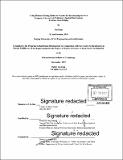| dc.contributor.advisor | Siqi Zheng. | en_US |
| dc.contributor.author | Fang, Sai,S.M.Massachusetts Institute of Technology. | en_US |
| dc.contributor.other | Massachusetts Institute of Technology. Center for Real Estate. Program in Real Estate Development. | en_US |
| dc.coverage.spatial | a-cc-pe | en_US |
| dc.date.accessioned | 2018-02-08T16:25:44Z | |
| dc.date.available | 2018-02-08T16:25:44Z | |
| dc.date.copyright | 2017 | en_US |
| dc.date.issued | 2017 | en_US |
| dc.identifier.uri | http://hdl.handle.net/1721.1/113479 | en_US |
| dc.description | Thesis: S.M. in Real Estate Development, Massachusetts Institute of Technology, Program in Real Estate Development in conjunction with the Center for Real Estate, 2017 | en_US |
| dc.description | Cataloged from PDF version of thesis. | en_US |
| dc.description | Includes bibliographical references (pages 65-66). | en_US |
| dc.description.abstract | Over the past several decades, the real estate market has surged in Beijing. Meanwhile, Beijing suffers severe air pollution now and then. Because of the dissatisfaction of air quality, clean air becomes a highly valued factor of the overall quality of life. When people choose to buy properties, they would be willing to pay more for a unit that is located in less polluted areas than for an otherwise identical unit that is located in more polluted areas. This study aims to establish a relationship between air pollution's spatial distribution and property price by using historical air quality record and property transaction data in Beijing. Although people cannot purchase clean air directly, variations in the air quality of different areas should be indirect reflected in housing prices. Employing the hedonic pricing model, the results suggest a strong positive relationship between a unit's resale price and the air quality of the area where the unit is located, meaning that properties that are located in an area with relatively better air quality are sold at a premium and vice versa. Besides, by using a matching regression, relationship between air quality's seasonal variation and property price is discovered, although it is not statistically significant. Another matching regression confirms that compared to property buyers, property renters care less about the air quality of the area where the unit is located, but care more about the unit's other specific locational attributes and physical attributes, such as job accessibility and interior decoration. | en_US |
| dc.description.statementofresponsibility | by Sai Fang. | en_US |
| dc.format.extent | 66 pages | en_US |
| dc.language.iso | eng | en_US |
| dc.publisher | Massachusetts Institute of Technology | en_US |
| dc.rights | MIT theses are protected by copyright. They may be viewed, downloaded, or printed from this source but further reproduction or distribution in any format is prohibited without written permission. | en_US |
| dc.rights.uri | http://dspace.mit.edu/handle/1721.1/7582 | en_US |
| dc.subject | Center for Real Estate. Program in Real Estate Development. | en_US |
| dc.title | Using hedonic pricing model to valuate the relationship between property price and air pollution's spatial distribution : evidence from Beijing | en_US |
| dc.type | Thesis | en_US |
| dc.description.degree | S.M. in Real Estate Development | en_US |
| dc.contributor.department | Massachusetts Institute of Technology. Center for Real Estate. Program in Real Estate Development | en_US |
| dc.contributor.department | Massachusetts Institute of Technology. Center for Real Estate | |
| dc.identifier.oclc | 1019904283 | en_US |
| dc.description.collection | S.M.inRealEstateDevelopment Massachusetts Institute of Technology, Program in Real Estate Development in conjunction with the Center for Real Estate | en_US |
| dspace.imported | 2019-09-16T18:48:50Z | en_US |

